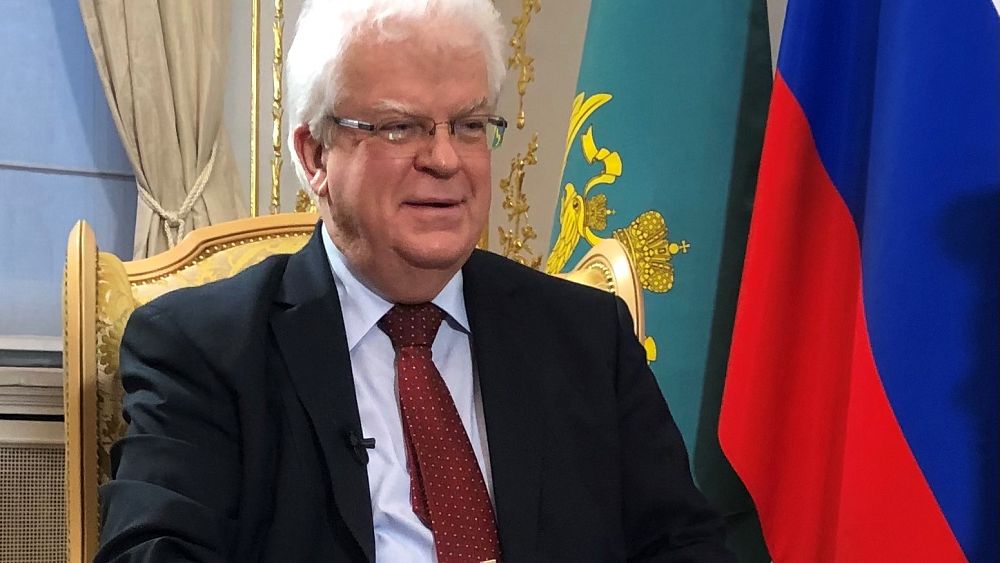
Fears of a Russian invasion of Ukraine are a “bluff” and a “hysterical message” being spread by Western countries, says Vladimir Chizhov, the long-time Russian ambassador to the European Union, adding the Kremlin has no plans to carry out such radical attack.
“Russia has no plans to invade either Ukraine or any other country. It’s a bluff created not in Russia but in those counties that are now spreading this hysterical message across Europe and the world,” Chizhov said in an interview with Euronews’ Efi Koutsokosta.
“We believe in diplomacy, and I can only hope that our interlocutors here in Europe and beyond the Atlantic, they stick to the same principle that any difference can and should be resolved by diplomatic means.”
The ambassador’s comments come in the midst of growing reports of division among NATO allies following on-the-record comments by US President Joe Biden and Germany’s decision to block Estonia from sending military equipment to Ukraine.
EU countries tried to dispel the rumours on Monday by reaffirming “strong unity” and pledging “unwavering support” for Kyiv. The following day, Josep Borrell, the bloc’s top diplomat, said Europe was facing its “most dangerous moment” since the Cold War.
“Europe is, of course, not in the most comfortable position. To that extent, I can agree,” Chizhov said, referring to Borrell’s ominous warning.
“Certain recent moves by NATO [have] increased the degree of instability across Europe and can be a source of concern for my good friend Borrell and others.”
Western powers keep calling on Russia to withdraw the contingent of more than 100,000 troops stationed in Ukraine’s vicinity, de-escalate tensions and comply with international law.
But in Moscow, President Vladimir Putin remains firm in his demands that NATO must halt its eastward expansion, rule out Ukraine’s membership and roll back its military forces, conditions the Kremlin wants to see enshrined in a “legally binding” international treaty.
“[What’s] at stake for Russia is Russian national security,” said Chizhov. “It’s not Russia getting closer to NATO, it’s NATO getting closer to Russia.”
Moscow is now examining a point-by-point written response from the US and NATO, even if Western allies have already dismissed Putin’s demands as “non-starters” and a desperate attempt attempt to reassert the spheres of influence that Russia lost after the collapse of the Soviet Union.
Washington has also made it clear that NATO’s open door policy is essential for the alliance and therefore non-negotiable, an assessment that Chizhov directly challenged during his interview with Euronews.
“Any ambitions, any plans to join any security alliance should [take] into regard the interests of national security of other countries, in this case, of countries that are next door,” the Ambassador said.
“[NATO’s] open door policy is formulated as if NATO existed in a vacuum, as if there was nobody else around NATO, but the doors may be open, but any enlargement cannot be to the detriment of security of other countries.”
As the border situation continues stuck in a diplomatic impasse, the talk of sanctions grows more menacing, with President Biden warning Putin could be personally punished should he order a military incursion. Meanwhile in Brussels, Borrell said the EU is “very well advanced” in the preparation of sanctions, although he has so far refused to give any specific details about the actual response.
Among the potential targets is Nord Stream 2, the massive gas pipeline that connects Russia and Germany and is still pending regulatory approval. Chizhov brushed off fears of economic retaliation against the conduit and said Russia would be able to sell its gas in other markets.
“I think that European consumers should be the first to be worried because they will live without relatively cheap Russia gas and abundance of it, and [they] will have to find other means of heating their homes,” the ambassador said when asked about retaliation against the gas conduit.
“Winter is not over yet,” he added.
With no prompt resolution in sight, the diplomatic campaign continues this week as a race against the clock.
Talks between France, Germany, Russia and Ukraine took place on Wednesday in the so-called Normandy format. French President Emmanuel Macron will speak with Putin on Friday, while a high-level delegation of eight Members of the European Parliament will travel to Ukraine on Sunday to conduct a fact-finding mission into the border crisis.
At the same time, NATO member states like Estonia, Lithuania, Latvia, Spain, Denmark, the UK and the US are stepping up their military support for Kyiv.